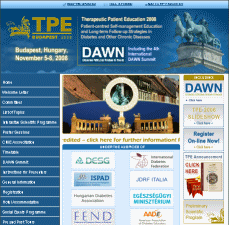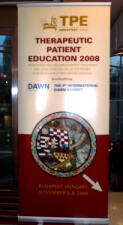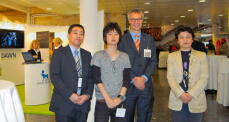いま、1型糖尿病は/内潟 安子 先生
2009年01月14日
43 Therapeutic Patient Education (TPE) and Idea Planned by Japanese Youth
I am writing this article on my flight to home after attending the Therapeutic Patient Education 2008 (TPE2008) conference.
Birth of Therapeutic Patient Education (TPE) TPE2008 website
 http://www.kenes.com/tpe/
http://www.kenes.com/tpe/Posters and the venue


(Photo provided by Tatsuzo Sakamoto)
From the left: Mr. Tatsuzo Sakamoto, Mr. Hirokazu Kono who gave a speech, Professor Thomas Danne, President of ISPAD, myself (at the far right)

(Photo provided by Hirokazu Kono)
The details are also covered in "Monthly Diabetes Life Sakae", magazine published by Japan Association for Diabetes Care and Education.
"DAWN Youth" is an international survey focusing on overcoming psychological challenges, and aiming at enabling patients, their families and people around them to express their opinions and at supporting diabetes studies and activities in order to improve lives of children and young people with diabetes and their families. It is conducted by the International Diabetes Federation (IDF), the International Society for Pediatric Adolescent Diabetes (ISPAD) and Novo Nordisk working in collaboration.
This has been a matter of commons knowledge among doctors and nurses engaged in diabetes care for many years.
For example, when super rapid-acting insulin products were developed, they were thought to improve blood glucose control drastically. Super rapid-acting insulin is very effective if used well, but if not used well, it does not improve glucose control at all. To give an extreme example, when patients with bulimia are prescribed super rapid-acting insulin, some of them reduce the dosage to half or skip the injection. This does not lead to better glucose control. Since they do not inject insulin, their glucose levels, of course, will not go down.
As mentioned above, even if new therapeutic drug is developed or new treatment strategy is introduced, that by itself will not produce any therapeutic effect. It has to be accompanied by adequate diet therapy (not only controlling meal size or energy intake but also the quality or meal time and so forth) and patients'determination to take medicine and inject insulin properly.
Because of this, the idea that educating patients to develop determination "to deal with diabetes with good understanding of the disease" is not simply education but a part of therapy in the field of diabetes has started to spread.
TPE is an academic conference to discuss exactly this topic as a focus, and it began in 2006 on a global level.
To have patients understand how to deal with the disease is also a therapy"Self-managing diabetes" is translated as "jiko kanri" (self-management) in Japanese.
Self-management requires patients to be not dependent on health care providers in addition to their abilities they have acquired including their innate ability, background, social skills etc. Health care providers are required "as professionals" to "cultivate" patients' skills to self-manage. Based on the concept of TPE, this is a therapy.
This means that health care providers have to learn how to develop patients'skills to self-manage on top of conventional medical knowledge when providing medical care.
Conventional diabetes care
There used to be no such subject as TPE covered by the studies at medical school or in internship. Even without such knowledge, prospective doctors or nurses could pass a national exam for medical practitioners or nurses.
Then, what was happening in actual diabetes outpatient care? Health care providers in the past have learned through imitating others' practices. They learned by watching outpatient practice of more experienced doctors. Some doctors inherently have such skills. In any case, it could be said that they have studied for themselves and coped with diabetes together with patients by motivating them.
Empowerment of diabetes patients
There is a term called "empowerment." The term could refer to "enabling to find ways to solve one's problems by oneself." Then, how should health care providers face patients to empower them? It would be fair to say that health care providers so far have had almost no knowledge or practice in terms of empowerment of patients.
Of course, education or counselor-training courses train students to be able to perform empowerment and so forth professionally. However, such courses did not exist in the field of diabetes. And having a Master of Education degree will not be sufficient to empower diabetes patients. It is extremely difficult to motivate a group of patients with disease such as diabetes coupled with eating disorder or depression. It will take more than an education degree to motivate such patients.
Then, the concept of "Therapeutic Patient Education (TPE)" was born. It could be said that patient education came about being built on science.
The world is seeking professionals in patient education
I have covered "DAWN Youth Survey" (http://www.dm-net.co.jp/ichigata/e040/) several times in the past articles. One objective of DAWN Youth is for health care providers to recognize the necessity of TPE, learn how to do empowerment and build up skills to cope well with lives of young diabetes patients and the environment facing them. It is also a move to establish a field of patient education from the viewpoint of science and roll it out on a global scale.
To conduct patient education scientifically also involves objective evaluation of the results. For example, if we educated ten patients on something and it was successful with four patients while not successful with the remaining six patients, we evaluate and study scientifically why and how it can be improved.
I am planning to ask health care providers who will attend our new group meetings (http://www.dm-net.co.jp/ichigata/e041/) to evaluate the meetings. It is not to check their understanding of the meetings but to scientifically evaluate if the method of group meetings is good or if there isn't anything unproductive and so forth. This kind of scientific evaluation is essential.
Idea by Japanese youth was selected
The results of the DAWN Youth Survey revealed "unmet needs." Before last summer, IDF, ISPAD and Novo Nordisk Pharma Ltd. planned a competition on a global scale inviting ideas from young people focusing on five action themes as to what they can do in their country to overcome those unmet needs. In Japan, with the consent of the Japan Association for Diabetes Care and Education (JADCE), we had six young people gather from around the country, have brainstorming sessions over and over and finally choose four ideas with budget secured and schedule set. Whether ideas are feasible as opposed to visionary is also a part of screening criteria in the competition.
As a result of the screening, the Japan team was selected to be the top 2, and one participant of the Japan team made an impressive presentation at the DAWN Youth Advisory Board conference and also at the youth session of the 4th International DAWN Summit in front of an audience of about 300. Prof. Martin Silink, IDF President, Prof. Thomas Danne, President of ISPAD and Prof. Anderson, expert in youth psychology all voiced words of generous praise for the presentation.
They are now going to carry their idea into action. We would like your understanding and support for these activities of young people led by JADCE. The details of their activities will be covered in "Monthly Diabetes Life Sakae" published by JADCE.
Recruiting attendees for
the 1st Group Meeting with Young Diabetes Patients
Date & Time: 11:00 am to 15:00 pm on Sunday, November 23, 2008 (already finished)
the 2nd Group Meeting with Young Diabetes Patients
Date & Time: 11:00 am to 15:00 pm on Friday(holiday), March 20, 2009 (already finished)
the 3rd Group Meeting with Young Diabetes Patients
Date & Time: 11:00 am to 15:00 pm on Sunday, June 21, 2009(already finished)
the 4th Group Meeting with Young Diabetes Patients
Date & Time: 11:00 am to 15:00 pm on Wednesday (holiday), September 23, 2009(already finished)
the 5th Group Meeting with Young Diabetes Patients
Date & Time: 11:00 am to 15:00 pm on Sunday, November 22, 2009(already finished)
Venue: Johnson & Johnson Diabetes Institute Sumitomo Fudosan Kudan Building 15th floor,1-8-10 Kudan Kita, Chiyoda-ku Tokyo 102-0073
Recruiting: 20 young diabetes patients (teens or older)15 health care providers involved in treatment of type 1 diabetes
>> For more details, visit
http://www.dm-net.co.jp/gm/
©2009 Yasuko Uchigata
治療的患者教育(TPE)と日本の若者の企画
いま、Therapeutic Patient Education 2008(TPE2008)という学会からの帰りの飛行機のなかで、書いています。
第4回DAWNサミットは、2008年11月4日〜6日にハンガリーのブタペストで開催された「TPE2008」のなかで開催されました。
TPE2008のホームページ
http://www.kenes.com/tpe/

ポスターと会場の様子


(写真提供 坂本辰蔵)
左から坂本辰蔵さん、口演した河野広和さん、ISPAD会長トーマス ダーネ教授、 筆者(右端)

(写真提供 河野広和)
DAWN Youth (ドーン ユース) は、特に心理社会的課題の克服に焦点を当て、糖尿病の子供や若者とその家族の生活を改善するために、患者や家族、周囲の人々が意見を述べること、また糖尿病に関する研究や活動を支援することをねらいとして実施されている国際的な研究です。国際糖尿病連合(IDF)、国際小児思春期糖尿病学会(ISPAD)、ノボ ノルディスクが連携し取り組んでいます。
このことは、糖尿病診療に長年携わってこられた先生や看護師の方々にはごく普通のこととして知られていたことです。
たとえば、超速効型インスリン製剤が開発されたとき、これで飛躍的に血糖コントロールが良くなるのだろうと思われました。しかし、超速効型インスリンは、上手に使ってもらえばとても良いのですが、うまく使用しないと良い血糖コントロールにはまったくなりません。もっと極端な例でいえば、過食症の方などに超速効型インスリンを使用していても注射を半分量にしたりスキップしたりする方がみられます。これでは血糖コントロールには結びつきません。スキップ、つまりインスリン注射をしないわけですから、当然血糖は下がりません。
このように、治療薬の開発、新しい治療戦略が発表されても、それはまず食事療法(量やエレルギーのことだけでなく、その質や食事する時間などの知識も含めて)がまずまずできていて、そして治療薬を飲む、インスリン注射をきちんとするのだというご本人の意思が育っていなければ、少しも治療効果が上がりません。
よって、患者さんに「糖尿病というものを理解してちゃんとやっていくのだ」という心をもってもらうための教育について「これも治療なのだ、教育のレベルを超えて糖尿病においては治療の一環なのだ」という考えが、広まってきました。
このTPEという学会は、まさしくこのことを中心課題として討議する学会で、2006年から、世界的に開催されるようになりました。
よって、医療従事者は、これまでの医学の知識とともに、患者さんの自己管理を養成する能力を学んで、診療にあたらなければならない、ということになりま
それでは、実際の糖尿病外来診療ではどうしていたのでしょうか。いってみれば見様見真似であったということでしょうか。先輩の先生の外来診療を拝見して体得していったり・・・、もともとそのような能力をもちあわせている先生もおられます。ともかく自学自習で勉強して、患者さんのやる気をおこして一緒に糖尿病に立ち向かうようにしてきたといえるでしょ
患者教育を科学的に行う。科学的に行うということは、きちっと評価も科学的に行うということです。10人の患者さんにあることを教育したら、4人はうまくいった。あとの6人の患者さんはなぜうまくいかなかったのだろう、どうすれば良いのか、このようにさらに科学的に考察していくわけですね。
新規に展開するグループミーティングも、参加する医療従事者には評価をお願いしようと思っています。自分の理解度のチェックではなく、グループミーティング自体のやり方が良いのか、無駄がないのか、科学的な評価というものが必要不可欠なのです。
審査の結果、上位2ヵ国に選出され、若者の1人が今回のドーンユースアドバイザリーボード会議で発表を行い、またTPE2008の学会に併せて開催された第4回インターナショナルDAWN サミットのユースセッションでも、堂々と約300人の聴衆を前に口演しました。IDF会長シリンク先生、ISPAD会長ダーネ先生、若者の心理研究の大家アンダーソン先生から、異口同音に、過分なおほめの言葉をいただきました。
これから、この企画の実施に向かいます。どうか、日本糖尿病協会の若者の活動に深いご理解をお願いいたします。内容の詳細は日本糖尿病協会が発行する雑誌「月刊糖尿病ライフ さかえ」に掲載されます。
「若い糖尿病患者さんとのグループミーティング」の活動について、詳しくはホームページをご覧ください。
※ヘモグロビンA1c(HbA1c)等の表記は記事の公開時期の値を表示しています。
Copyright ©1996-2026 soshinsha. 掲載記事・図表の無断転用を禁じます。
治療や療養についてかかりつけの医師や医療スタッフにご相談ください。

 医療・健康情報グループ検索
医療・健康情報グループ検索